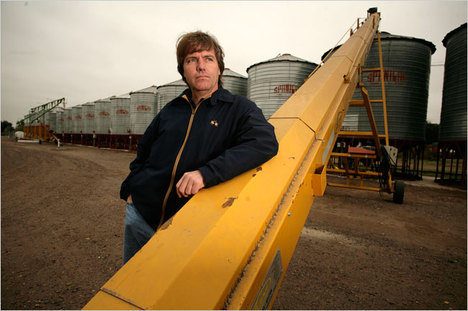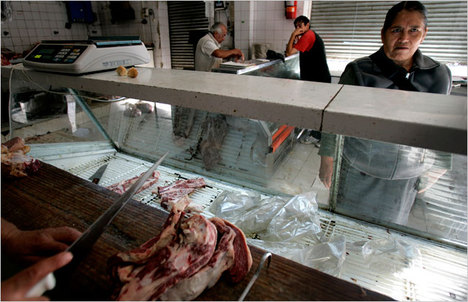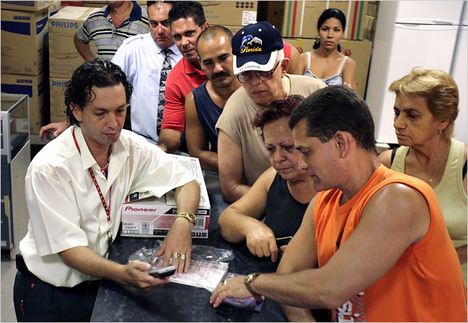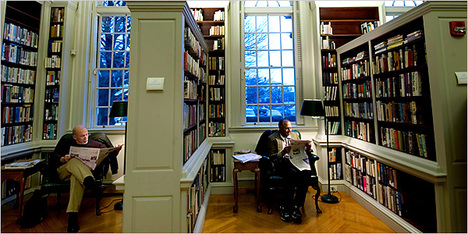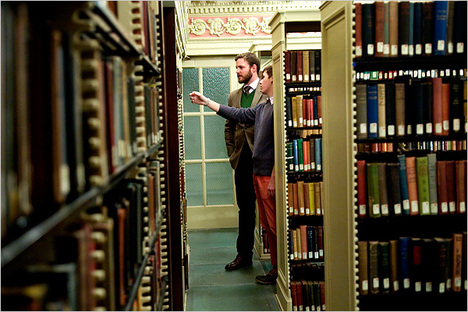I agreed to have my name added to the “Economist’s Statement” below, which was released to the press on Mon., July 7th. My general view is that free markets encourage morality, free choice, efficiency, and innovation; and that John McCain is much more likely to adopt free market policies than is Barack Obama.
Economists’ Statement:
We enthusiastically support John McCain’s economic plan. It is a comprehensive, pro-growth, reform agenda. The reform focuses on the real economic problems Americans face today and will face in the future. And it builds on the core economic principles that have made America great.
His plan would control government spending by vetoing every bill with earmarks, implementing a constitutionally valid line-item veto, pausing non-military discretionary government spending programs for one year to stop their explosive growth and place accountability on federal government agencies.
His plan would keep taxes from rising, because higher tax rates are exactly the wrong policy to restore economic growth, especially at this time.
His plan would reduce tax rates by cutting the tax that corporations pay to 25 percent in line with other countries, by completely phasing out the alternative minimum tax, by increasing the exemption for dependents, by permitting the first-year expensing of new equipment and technology, and by making permanent a reformed tax credit for R&D.
His plan would also create a new and much simpler tax system and give Americans a free choice of whether to pay taxes under that simple system or the current complex and burdensome income tax.
His plan would open new markets for American goods and services and thereby create additional jobs for Americans by supporting good free trade agreements, such as the one with Colombia, and working with leaders around the world to avoid isolationism and protectionism. His plan would also reform education, retraining, and other assistance programs so they better help those displaced by trade and other changes in the economy. His plan addresses problems in the financial markets and housing markets by calling for increased transparency and accountability, by targeted assistance to deserving homeowners to refinance their mortgages, and by opposing so-called reform plans which would raise the costs of home-ownership in the future.
The above actions, as well as plans to address entitlement programs — especially Social Security, Medicare and other government health care programs — and his regulatory reforms — especially in the area of health care — constitute a broad and powerful economic agenda. Because of John McCain’s experience working with the American people in all walks of life, with members of Congress on both sides of the aisle, and with leaders around the world, we are optimistic that these plans will become a reality and will create jobs and restore confidence and strong economic growth.
Economists Who Have Signed The Statement:
Burton Abrams, University of Delaware
James D. Adams, Rensselaer Polytechnic Institute
Douglas K. Adie, Ohio University
Richard Agnello, University of Delaware
William Albrecht, University of Iowa
Constantine Alexandrakis, University of Massachusetts at Dartmouth
William Alpert, University of Connecticut
Wayne Angell, Former Fed Governor
Fernando E. Alvarez, University of Chicago
Geoffrey T. Andron, Austin Community College
George R. Averitt, Purdue University North Central
Charles Baird, California State University, East Bay
Howard Beales, George W ashington University
Stacie E. Beck, University of Delaware
Gary Becker, University of Chicago
Donald Bellante, University of South Florida
Daniel K. Benjamin, Clemson University
John J. Bethune, Barton CollegeSanjai Bhagat, University of Colorado
Andrew G. Biggs, American Enterprise Institute
Robert G. Bise, Orange Coast College
Michael K. Block, University of Arizona
Donald Booth, Chapman University
Karl J. Borden, University of Nebraska
Michael Bordo, Rutgers University
George H. Borts, Brown University
Mich ael Boskin, Stanford University
Daniel P. Brandt III, Washington, D.C.
Ike Brannon, Department of the Treasury
David P. Brown, University of Wisconsin-Madison
Jeff Brown, University of Illinois at Urbana-Champaign
Joseph Brusuelas, Merk Investments
Phillip J. Bryson, Brigham Young University
Andrzej Brzeski, University of California, Davis
James Buchanan, George Mason University
Todd Buchholz, Two Oceans Management
Richard Burdekin, Claremont McKenna College
Richard V. Burkhauser, Cornell University
James B. Burnham, Duquesne University
Andr ew B. Busch, BMO Capital Markets
James L. Butkiewicz, University of Delaware
Mark Calabria, United States Senate
James Carter, Vienna, VA
Don Chance, Louisiana State University
Barry R. Chiswick, University of Illinois at Chicago
Bhagwan Chowdhry, UCLA
Richard Clarida, Columbia University
Candice Clark, Economic consultant
Kenneth W. Clarkson, University of Miami
Warren Coats, IMF, retired
John Cogan, Hoover Institution
Boyd D. Collier, Tarleton State University
Michael Connolly, University of Miami
Kathleen B. Cooper, Southern Methodist University
Joshua Coval, Harvard University
Ted Covey, McLean, Virginia
Nicole Crain, Lafayette College
W. Mark Crain, Lafayette College
Dan Crippen, Former CBO Director
Thomas D. Crocker, University of Wyoming
Robert L. Crouch, University of California, Santa Barbara
Mario J. Crucini, Vanderbilt University
Ward S. Curran, Trinity College
Coldwell Daniel III, The University of Memphis
Antony Davies, Duquesne University
Steven Davis, University of Chicago
Clarence R. Deitsch, Ball State University
Richard DeKaser, National City Corporation
Stephen J. Dempsey, University of Vermont
Christopher DeMuth, American Enterprise Institute
David B.H. Denoon, New York University
William G. Dewald, Ohio State University
Arthur M. Diamond Jr., University of Nebraska at Omaha
John Diamond, Rice University
David L. Dickinson, Appalachian State University
Francis X. Diebold, University of Pennsylvania
Jeffrey H. Dorfman, University of Georgia
Thomas J. Duesterberg, Manufacturers Alliance/MAPI
Parnell Duverger, Broward Community College
Isaac Ehrlich, SUNY at Buffalo
Martin Eichenbaum, Northwestern University
Jeffrey A. Eisenach, Criterion Economics
Michael A. Ellis, Kent State University
Joachim G. Elterich, University of Delaware
Kenneth Elzinga, University of Virginia
Stephen J. Entin, Institute for Research on the Economics of Taxation
T.W. Epps, University of Virginia
Michael G. Erickson, The College of Idaho
Paul Evans, Ohio State University
Dino Falaschetti, Hoover Institution
Frank Falero Jr., California State University
Susan K. Feigenbaum, University of Missouri, St. Louis
Martin Feldstei n, Harvard University
Eric Fisher, California Polytechnic State University
Arthur A “Trey” Fleisher III, Metro State College of Denver
James Forcier, University of San Francisco
William F. Ford, Middle Tenn. State U.
Michele Fratianni, Indiana University
Luke Froeb, Vanderbilt University
Kenneth C. Froewiss, NYU Stern School of Business
Diana Furchtgott-Roth, Hudson Institute
Timothy S. Fuerst, Bowling Green State University
Lowell Gallaway, Ohio University
B Delworth Gardner, Brigham Young University
Dave Garthoff, The University of Akron
Ilhan K. Geckil, Anderson Economic Group
Rick Geddes, Cornell University
Joseph A. Giacalone, St. John’s University
Adam Gifford, California State University, Northridge
David Gillette, Truman State University
Micha Gisser, University of New Mexico
Amy Jocelyn Glass, Texas A&M University
Charles J. Goetz, The University of Virginia
Claudio Gonzalez-Vega, The Ohio State University
Lawrence Goodman, Bergen City, NJ
Barry K. Goodwin, North Carolina State University
Eric S. Graber, Independent Economist
Douglas H. Graham, The Ohio State University
J. Edward Graham, University of North Carolina Wilmington
Phil Gramm, Former U.S. Senator
Teresa Beckham Gramm, Rhodes College
Wendy Lee Gramm
William B. Green, Sam Houston State University
Kenneth Greene, Binghamton University
Paul Gregory, University of Houston
Earl Grinols, Baylor University
Gary Hansen, UCLA
Eric Hanushek, Hoover Institution
Stephen Happel, Arizona State University
James E. Hartley, Mount Holyoke College
Kevin Hassett, American Enterprise Institute
Joel W. Hay, University of Southern California
Jared E. Hazleton, Texecon: A Texas Economic Consulting Firm
Charles E. Hegji, Auburn University Montgomery
Robert H. Heidt, Indiana University School of Law
Harold M. Hochman, CUNY Graduate Center and Lafayette College
Robert J. Hodrick, Columbia Business School
Stuart G. Hoffman, The PNC Financial Services Group
Arlene Holen, Washington, D.C.
Mac R. Holmes, Troy University
Douglas Holtz-Eakin, John McCain 2008
C. Thomas Howard, University of Denver
E. Philip Howrey, University of Michigan
Glenn Hubbard, Columbia University
James L. Huffman, Lewis & Clark Law School
J. Christopher Hughen, University of Denver
E. Kingdon Hurlock, Calvert Investment Counsel
Stephen L. Jackstadt, University of Alaska, Anchorage
Joseph M. Jadlow, Oklahoma State University
Sherry L Jarrell, Wake Forest University
Michael C. Jensen, Harvard Business School
Dennis A. Johnson, University of South Dakota
Shane A. Johnson, Texas A&M University
Richard Just, University of Maryland
Tim Kane, Washington, D.C.
Steven Kaplan, University of Chicago Graduate School of Business
Alexander Katkov, Johnson and Wales University
Melissa Kearney, University of Maryland
Joe Kennedy, Arlington, Virginia
Lawrence W. Kenny, University of Florida
Calvin A. Kent, Marshall University
E. Han Kim, University of Michigan
Robert G. King, Boston University
Paul R. Koch, Olivet Nazarene University
Meir Kohn, Dartmouth College
James W. Kolari, Texas A&M University
Roger C. Kormendi, Kormendi/Gardner Partners
Marvin Kosters, American Enterprise Institute
Robert Krol, California State University, Northridge
Anne Krueger, Johns Hopkins University
Deepak Lal, University of Cal ifornia, Los Angeles
Douglas Lamdin, The University of Maryland, Baltimore County
Daniel L Landau, University of Connecticut
Richard La Near, Missouri Southern State University
Nicholas A. Lash, Loyola University
Don R. Leet, California State University, Fresno
Norman B. Lefton, Southern Illinois University at Edwardsville
Tom Lehman, Indiana Wesleyan University
Thomas M. Lenard, Technology Policy Institute
Noreen E. Lephardt, Marquette University
Adam Lerrick, Carnegie Mellon University and the American Enterprise Institute
Philip I. Levy, American Enterprise Institute
W. Cris Lewis, Utah State University
Andrew Light, Liberty University
Jane Lillydahl, University of Colorado at Boulder
Zheng Liu, Emory University
Luis Locay, University of Miami
John R. Lott Jr., University of Maryland
Lawrence W. Lovik, Alabama Policy Institute
Robert Lucas, University of Chicago
John Lunn, Hope College
R. Ashley Lyman, University of Idaho
Paul W. MacAvoy, Yale School of Management
Glenn MacDonald, Washington University in St. Louis
John Makin, American Enterprise Institute
Burton Malkiel, Princeton University
David Malpass, Encima Global LLC
Michael Marlow, California Polytechnic State University
Donald J. Marshall, Consulting Engineer and Economist
Aparna Mathur, American Enterprise Institute
Timothy Matthews, Kennesaw State University
John Matsusaka, University of Southern California
Bennett McCallum, Carnegie Mellon University
Paul W. McCracken, University of Michigan
Martin C. McGuire, University of California-Irvine
W. Douglas McMillin, Louisiana State University
Roger Meiners, University of Texas – Arlington
Will Melick, Kenyon College
Allan Meltzer, Ca rnegie Mellon University
John Merrifield, University of Texas at San Antonio
Paul Merski, Independent Community Bankers of America
Jim Mietus, Great Falls, VA
Todd Milbourn, Washington University in St. Louis
Geoffrey P. Miller, New York University Law School
James Miller, George Mason University and The Hoover Institution
William C. Miller, Pioneer Analytics LLC
David E. Mills, University of Virginia
Velma Montoya, National Council of Hispanic Women
Michael Moore, George Washington University
Charles Britt Moss, University of Florida
Robert Mundell, Columbia University
Tim Muris, George Mason University
David B. Mustard, University of Georgia
Richard F. Muth, Emory University
Anthony N. Negbenebor, Gardner-Webb University
Charles Nelson, University of Washington
Robert J. Newman, Louisiana State University
Michael P. Niemira, International Council of Shopping Centers
Tom O’Brien, University of Connecticut
Lee E. Ohanian, UCLA
June O’Neill, Baruch College, CUNY
Steve Parente, University of Minnesota
Randall Parker, East Carolina University
Douglas Patterson, Virginia Tech
Tim Perri, Appalachian State University
Mark J. Perry, University of Michigan-Flint
Tomas Philipson, University of Chicago
William Poole, University of Delaware
Michael E. Porter, Harvard Business School
Barry Poulson, University of Colorado Boulder
James Prieger, Pepperdine University
R. David Ranson, H. C. Wainwrigth & Co. Economics Inc.
Richard Rawlins, Missouri Southern State University
Martin A. Regalia, Gaithersburg, Maryland
Barrie Richardson, Centenary College
Christine P. Ries, Georgia Institute of Technology
Aldona Robbins, Fiscal Associates
Gary Robbins, Fiscal Associates
Kenneth Rogoff, Harvard University
Richard Roll, UCLA
Harvey Rosen, Princeton University
Larry L. Ross, University of Alaska, Anchorage
Robert Rossana, Wayne State University
Timothy P. Roth, The University of Texas at El Paso
Charles Rowley, George Mason University
Paul H. Rubin, Emory University
Roy Ruffin, University of Houston
Gary J. Santoni, Ball State University
T.R. Saving, Texas A&M University
Mike Schuyler, Institute for Research on the Economics of Taxation
Anna Schwartz, National B ureau of Economic Research
Loren C. Scott, Louisiana State University
Robert Haney Scott, California State University, Chico
Carlos Seiglie, Rutgers University
Richard Selden, University of Virginia
John Semmens, Laissez Faire Institute
Sol S. Shalit, University of Wisconsin
Alan Shapiro, University of Southern California
Judy Shelton
William F. Shughart II, The University of Mississippi
George Shultz, Hoover Institution
Jerome Siebert, University of California, Berkeley
John Silvia, Wachovia
Chuck Skipton, University of Tampa
Scott B. Smart, Indiana University
Amy Smith, Former OMB Chief Economist
James F. Smith, The University of North Carolina
Vernon Smith, Chapman University
Sean M. Snaith, University of Central Florida
Douglas Southgate, Ohio State University
Frank Spreng, McKendree University
Beryl W. Sprinkel, Retired
Stan Spurlock, Mississippi State University
George J. Staller, Cornell University
Craig A. Stephenson, Babson College
Houston Stokes, University of Illinois at Chicago
Courtenay C. Stone, Ball State University
Scott Sumner , Bentley College
James Sweeney, Stanford University
Richard Sweeney, Georgetown University
Robert Tamura, Clemson University
Clifford Tan, Stanford Center for International Development
John A. Tatom, Indiana State University
John Taylor, Stanford University
Paul Taylor, Vienna, VA
Teresa Tharp, Valencia Community College
Clifford F. Thies, Shenandoah University
Henry Thompson, Auburn University
Walter N. Thurman, North Carolina State University
Jerry G. Thursby, Georgia Institute of Technology
Robert D Tollison, Clemson University
William N. Trumbull, West Virginia University
Kamal Upadhyaya, University of New Haven
Charles W. Upton, Kent State University
Peter J Van Blokland, University of Florida
T. Norman Van Cott, Ball State University
Richard Vedder, American Enterprise Institute
George J. Viksnins, Georgetown University
J. Antonio Villamil, The Washington Economics Group
Richard E. Wagner, George Mason University
William B. Walstad, University of Nebraska-Lincoln
Murray Weidenbaum, Washington University in St. Louis
Marc D. Weidenmier, Claremont McKenna College
Finis We lch, Texas A&M University
James B. Whitaker, Centreville, VA
John Wicks, University of Montana
Wayne H. Winegarden, Arduin, Laffer & Moore Econometrics
Gary Wolfram, Hillsdale College
DeVo L. Yoho, Ball State University
Nancy A. Yonge, Smith Center for Private Enterprise
Paul J. Zak, Claremont Graduate University
Mokhlis Y. Zaki, Northern Michigan University
Mark Zandi, Malvern, PA
Arnold Zellner, University of Chicago
Kate Zhou, University of Hawaii
Joseph Zoric, Franciscan University of Steubenville
Benjamin Zycher, Manhattan Institute for Policy Research
* Affiliations are listed for identification purposes only.

